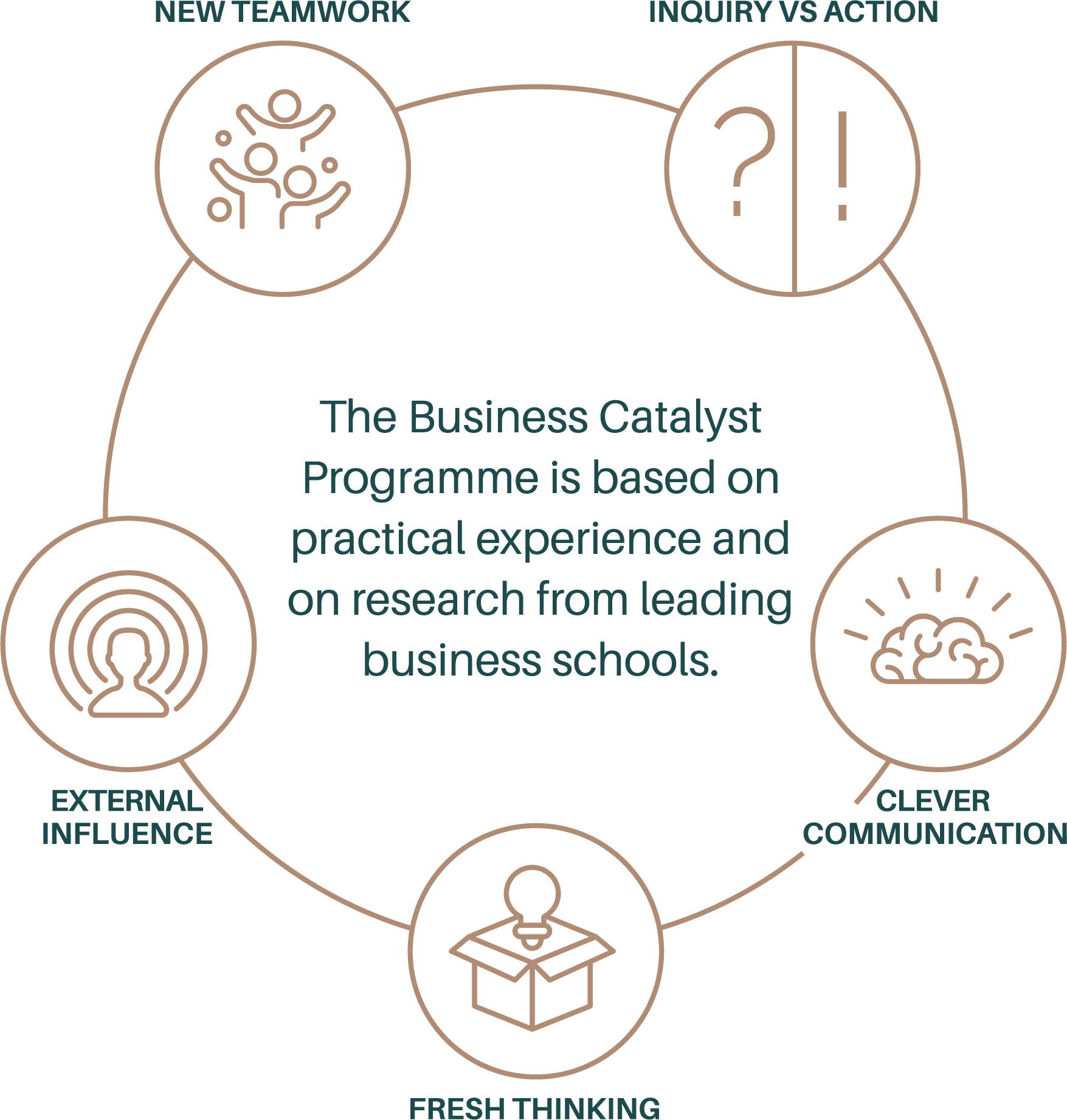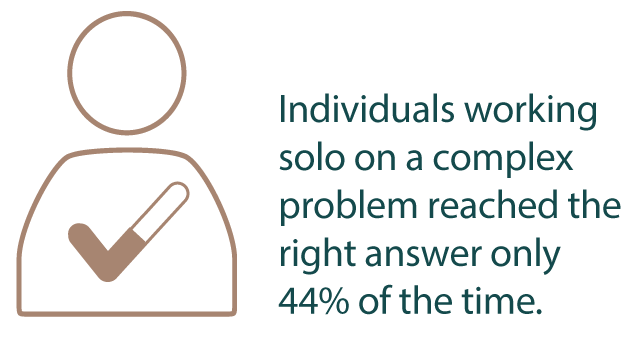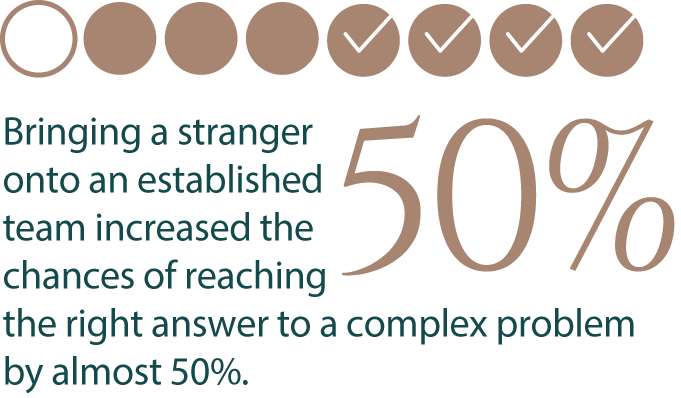HOW SCIENCE INFORMS EVERYTHING WE DO
INQUIRY VS ACTION
Look at the problem, before rushing to the solution
If we are to reach an effective solution, we need to properly understand the problem and that needs the perspective of every team member. Researcher David Hofmann at MIT contrasted a leadership team with a jury in a courtroom. In a courtroom the jury hears all of the evidence at the same time. In contrast, when business discussions are held piecemeal, information is fragmented and not available to the whole group. We work hard to ensure every member of the team is heard and that reaching a thorough understanding of a problem comes before any action.
A strategy needs de-risking before execution
Robert Sutton at Stanford University suggests teams should have a pre-mortem before they execute a strategy. This helps the team face any potential consequences of their decisions before they take action. By imagining ahead of time that a plan has failed miserably or that is has been a spectacular success, a culture of critique, enquiry and collective responsibility can be created. Pre-mortems are far less contentious than post-mortems, which often come too late, if at all.
Address the facts and then use your intuition
Daniel Kahneman, the Nobel prize winner and author of ‘Thinking Fast and Slow’, advocates a structured approach to strategic decision making. He agrees with the common view that intuition plays an important part in decision-making but argues it should only come into play after the team has understood and made a thorough assessment of all the facts. Without this rigour, decisions are likely to be skewed by biases, such as valuing losses more than gains, focusing on the near future more than the distant future, and favouring vividly presented anecdotes more than dull statistics.
A NEW TYPE OF TEAMWORK
Solve problems in a better way by working as a team
We’re all about team work. If just one person is given responsibility for solving a strategic challenge, they rarely provide the best answer, regardless of their skills and experience. Researchers at Columbia Business School found that individuals working solo on a complex problem with three possible solutions reached the right answer only 44% of the time.
But know when to work alone and when to work together
Ethan Bernstein at Harvard Business School has shown that individuals are better at idea generation (divergent thinking) while groups are better at evaluating and refining ideas (convergent thinking). Bernstein found that teams who work individually on a project but also come together from time to time generate the highest quality and most novel solutions. Also, Massachusetts Institute of Technology (MIT) researchers found that people are far more committed to a conclusion if they feel they have discovered it for themselves. The Business Catalyst Programme brings individual contributions into group discussions so that the whole team own the end result.
People need a ‘burning platform’ to change
A team at Harvard Business School reviewed more than 100 companies and concluded that without a sense of urgency, people cling to the status quo and resist change. For this reason senior level buy-in is a pre-requisite for the Business Catalyst Programme.
THE POWER OF EXTERNAL INFLUENCES
Bring in a stranger to increase your chances of reaching the right answer
Researchers at Columbia Business School found that bringing a stranger onto an established team increased the chances of reaching the right answer to a complex problem by almost 50%. When we bring the Business Catalyst Programme into a team, our presence encourages the team to be more engaged. It also legitimises new perspectives, helping the team develop a better understanding of the challenge and possible solutions.
Don’t appoint a devil’s advocate
University of California, Berkeley (UC Berkeley) showed that appointing a devil’s advocate within a team doesn’t help promote a minority viewpoint. Even when the person assigned the role actually believes in their argument, the very fact their role has been assigned is enough to undermine their persuasiveness. However, when someone from the outside, like us, has an authentic but different view, it helps to clarify the analysis and embolden the team.
FRESH THINKING
Don’t be afraid of ‘wrong’ suggestions or ideas
Charlan Nemeth at UC Berkeley found that even a ‘wrong’ question or answer is helpful as it stops a knee-jerk consensus. ‘Minority viewpoints are important, not because they tend to prevail but because they stimulate divergent attention and thought…even when they are wrong, they contribute to the detection of novel solutions and decisions.’ With the Business Catalyst Programme, our fresh perspective helps the leadership team use their extensive experience and knowledge differently; we contribute new ideas and encourage the team to question long-standing assumptions.
Find an alternative to brainstorming
In brainstorming sessions people can feel less motivated to do something when they know others might do it instead. Being in a group can actually prevent the flow of ideas as some may have social anxiety about contributing. Also only one idea can be heard at a time in a group setting, with research showing that the number of ideas per person declines as group size increases. Some talented people in the group might also end up regressing to match less talented colleagues. Throughout the Business Catalyst Programme, we look at innovative ways to bring out the best ideas from individual team members.
CLEVER COMMUNICATION
Find new ways to facilitate discussions
Researchers at Kellogg School of Management found that in a group of four people, two of them will talk for 62% of the time; in a group of six, three will talk for 70% of the time. This means that at a minimum, the views of half the group are not properly heard, and as groups get bigger, their discussions are dominated by a smaller proportion of individuals. We facilitate discussions towards more even communication so that all views are solicited and taken on board.
Anonymise contributions if you want to generate lots of ideas
The Kellogg team also found that anonymising ideas separates the idea from the status of the person who came up with it. This helps to create a level playing field where people can debate the quality of a proposal rather than be influenced by the seniority of the proposer. We build this facility into the programme at different stages.
Don’t take strategic issues ‘offline’ to save time in management meetings
If your goal is to have a well-informed team, it’s important to discuss things together. For example, a team of seven would need 21 one-on-one discussions to replace a single discussion where they’re all present. We help teams establish clear and effective ways to communicate together.




